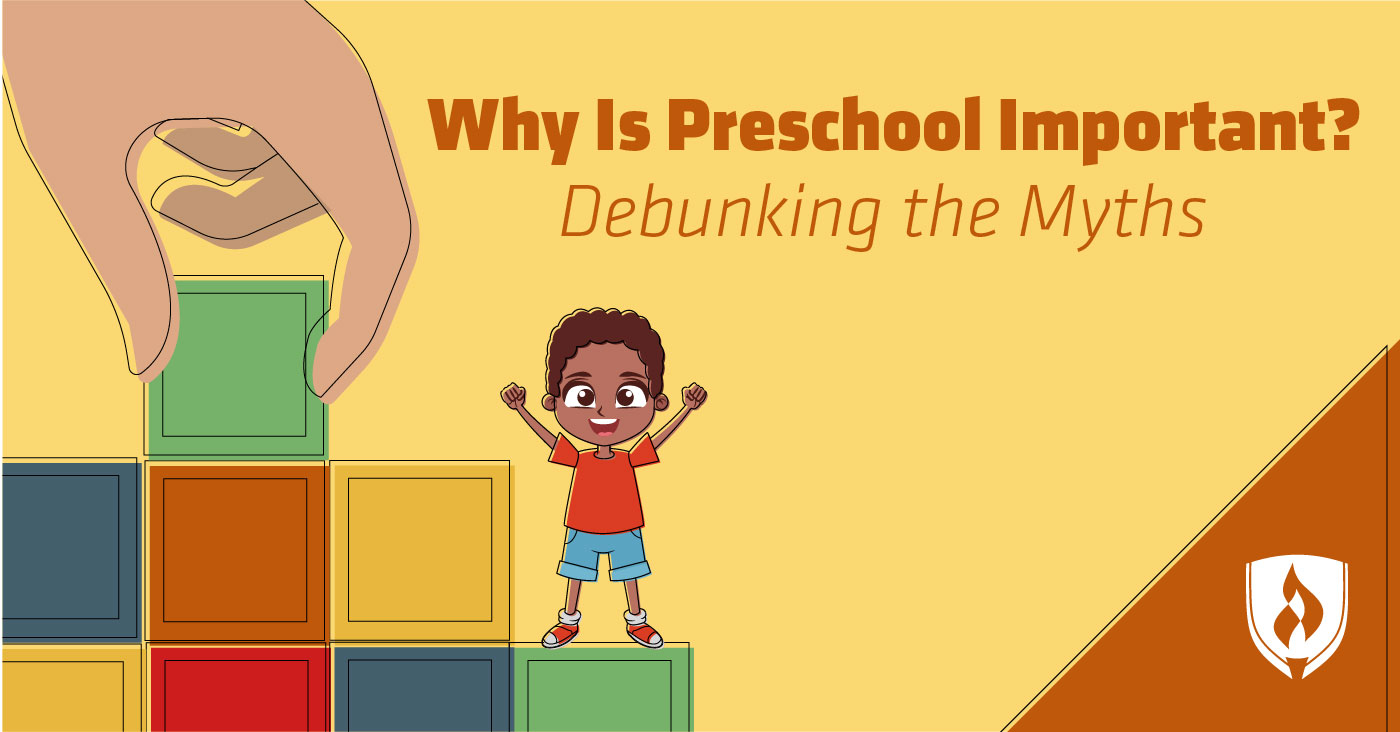Now that we’re parents ourselves, the tables have turned. We’re faced with myriad of decisions about where to send our kids to school, which play dates to organize, where we should spend extra money in the store’s organic section or what to do when our little one is bullied. Why do our childhoods seem like the ancient past, and how did our parents survive this constant decision-making process without completely sabotaging our development?

Parents have important choices to make regarding their kids’ education—and these decisions are coming sooner and sooner. Kindergarten is seen as the new first grade and academic rigor is increasing. This means it’s even more important for parents to make sure their kids are on a good developmental footing. One of the best ways to do this is through a quality preschool education program.
But there are still plenty of people who don’t believe preschool is important or are otherwise skeptical of its benefits. We’ve asked early childhood education experts to weigh-in on some of the commons myths or misunderstandings about preschool and help explain exactly why preschool is so important.
4 Common myths about the value of preschool
The importance of preschool has become a hot topic among politicians, school districts and parents, to name just a few stakeholders in the world of education. We identified the most common misconceptions about preschool and went to work debunking the following myths through research and interviews with the professionals.
“All the kids do is play games and sing songs.”
“If all they did all day was play and sing songs, then the parents should be thanking me! The value of play is the top priority in my classroom,” says Jane Fitzsimmons, a veteran preschool teacher at St. Mary’s School. “What better way for children to learn how to build, create, problem solve, cooperate, communicate, enjoy activities, learn diversity, build self-esteem and be a part of a loving community—where all are accepted,”
While many perceive playing games and singing songs as merely frivolous and entertaining ways to pass the time, research has shown that activities like playing games and singing songs are precisely the ways in which preschool-aged kids develop the most connections in their brains.
- Singing songs encourages speech and language development, enhancing vocabulary and communication skills. Students who struggle with a certain skill (ABCs, counting or math patterns) are able to show mastery through learning a song about it.
- Playing games is the perfect opportunity for kids of this age to express their curiosity, learn teamwork, practice sharing and develop problem-solving skills.
Check out Jeff A. Johnson and Denita Dinger’s book, “Let Them Play: An Early Learning (Un)Curriculum,” to discover more about the value of play and activities specifically researched and proven to maximize brain development.
“I can teach all of these things at home.”
One of the biggest mistakes parents make about their approach to preschool is taking on an adversarial relationship with teachers—for example, thinking, “Why would I send my child to preschool when I can do an equal or better job at home?”
Preschool teachers aren’t trying to undermine parents or downplay their abilities to teach their kids—children obviously can and do learn much from their families. That being said, it’s not fair to discredit the capabilities of preschool teachers. They are highly trained educational professionals and are specifically trained with techniques to enhance a child’s physical, social, emotional, cognitive and language development. They know how to immerse children in engaging learning experiences and have years of experience doing it. Preschool does not discount the skills you teach your child at home. It reinforces them in a new environment and ensures all areas of the brain are intentionally activated.
Fitzsimmons also emphasizes the importance of the social aspect in preschool. While a child might be able to learn activities from a parent or guardian at home in isolation, he or she will miss out on the importance of peers being part of the experience. Kids in preschool have the opportunity to practice sharing, tying their shoes, using scissors and getting a backpack ready while being surrounded by other little humans of the same age. It is not only the trained professionals in the room, but also the peers that enhance the learning experience—making it difficult to replicate at home.
“The benefits of preschool don’t last.”
“How could my child’s third or fourth year of life significantly impact his or her future? I can’t even remember what I was doing at that age!”
While many of us don’t remember our earliest years, the first five years are most crucial due to the brain’s ability to make connections. Our capacity to develop vocabulary, a lifelong communication skill, is largely decided by the time we reach age five. Many longitudinal studies conducted around long-term effects of preschool show a strong relationship between preschool attendance and success in diverse areas of life.
The HighScope Perry Preschool study divided students of ages three and four into two groups (those who attended preschool programs and those who did not), and tracked them through the age of 40. The research concludes that students who attended preschool had higher earnings, were more likely to hold a job, had committed fewer crimes and were more likely to graduate from high school.
Varda Epstein, mother of 12, preschool teacher of eight years and volunteer with Kars4Kids, explains that children who attend preschool are more likely to be successful in Kindergarten, then first grade and continuing through college. Although it might be hard for some to believe, the groundwork for successful experiences in the education system is largely established before Kindergarten even starts.
“Preschool is only for children from well-off families.”
This misconception is based in some truth. While the U.S. government and each state has funding of public education that is universal for everyone from Kindergarten through high school, funding is much more uneven for preschool programs. Because of this, many parents who would like their child to attend preschool are at a loss when faced with how to pay for it.
Fortunately for those families, reformers armed with research showing the value of pre-K are making strides legislatively as more and more government money is being dedicated to these programs. Some states fully fund preschool for all children, and many states have legislation in the process to do so. Many schools also offer financial aid to families who make preschool possible. Additionally, Head Start is an early childhood education program that has been active since 1965 and provides education for children from low-income families from birth to age five.
The importance of preschool is undeniable
It’s understandable if you’ve been skeptical of the value of a preschool education—children at this age are so little, and the things they’re learning seem relatively simple. But as you know now, there’s more that goes into teaching preschool children. The time kids spend in pre-K programs is used to develop a foundation for a lifetime of learning—and that matters!
Now that you know more about the importance of preschool education, have you considered making the jump from parent to educator? If so, you’ll want to read our article, “Would I Be a Good Teacher? 6 Questions to Consider Before Working with Kids,” to learn more about what to expect from the field.
Related Articles:
- What Do Preschoolers Learn? What to Expect in Early Education
- 35 Enlightening Light Table Activities for Kids
- What Is Reactive Attachment Disorder? A Practical Guide for Educators
- The 15 Best Fictional Teachers of All Time
- 11 Engaging STEM Activities for Kids that Will Foster Curiosity
- 15 Fantastic Winter Activities for Toddlers
- Home-Based vs. Center-Based Child Care: Which Work Environment Fits You?
EDITOR'S NOTE: This article was originally published in June 2014. It has since been updated to include information relevant to 2018.




